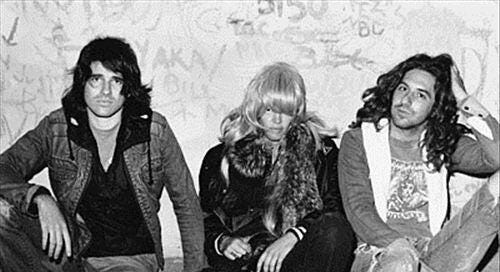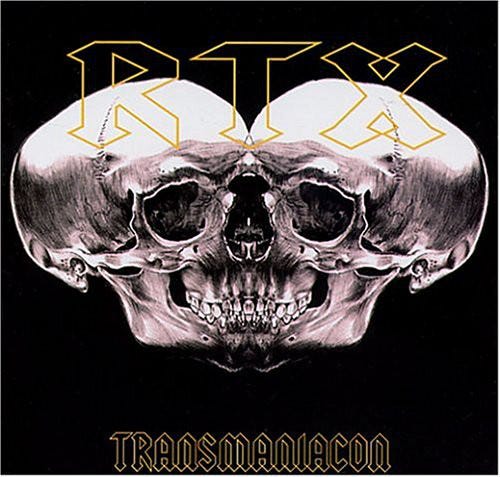Some bonus content to accompany our recent deep dive into the storage space CD archives: My interview with Jennifer Herrema (Royal Trux, RTX) from the LA Weekly 17 years (?!) ago.
I included a song from her 2012 Black Bananas album on ID Music 20210820, and while I was digging around I realized that the LA Weekly online archive is in a state of serious decay. This is one my favorite interviews, and I’d like it to be available somewhere other than the Wayback Machine. I didn’t stay in touch with Herrema, but every once in awhile she’d pop into the booth at Little Joy on nights when I was DJing, if only to get a break from the crowd and crush a Virginia Slim or two.
Shockwave Rider: Jennifer Herrema and RTX, rolling free
by Daniel Chamberlin
LA Weekly // September 10 - 16, 2004
In the summer of 2000, Royal Trux, one of the greatest rock bands of the ’90s, seemed to be on a roll. The two core members — the husband-and-wife team of Neil Hagerty and Jennifer Herrema — had kicked infamous heroin habits and were on tour supporting one of the best albums of their 15-year career. Pound for Pound was a formidable chunk of mystically rural rock & roll, a full platter of blues and soul with bongo runs, psychedelic flutes and squealing guitars. Hagerty crooned like Curtis Mayfield while Herrema loosed guttural roars like the dude from Molly Hatchet. The couple lived in an isolated house in the mountains of Virginia’s Rappahannock County, and their album sounded like squirrel-meat-eating stoners tinkering with a gas-guzzling Monte Carlo. It was the buzz from a party of backwoods bohemians too in tune with their own strawberry gardens to abandon country life for the city grind.
Herrema’s parents lived on a 150-acre plot of land an hour north. Around the time that his daughter was headed out on the Pound for Pound tour, Robert Herrema became concerned with a tree branch looming over the farmhouse he shared with his wife, Joan Herrema. One day he clambered up into this pine, fired up his chain saw and cut down the offending limb without incident. Except for a pain in his shoulder that wouldn’t go away.
Robert was not big on doctors, but he was willing to make an exception, as he thought he’d broken his collarbone. It turned out that not only was his clavicle fractured, it was rife with esophageal cancer that had metastasized throughout his body. Still in his early 50s, he was given four months to live. Robert and Joan waited for a week to call their daughter, eventually delivering the news in a Pittsburgh motel room. “There was this fugue state,” she recalls, the memory contrasting with the sunny afternoon by the pool at her manager’s Hollywood Hills house. “I wanted back in the womb. Just fuck all this. So I called up the hospital,” she laughs. “Not his hospital, the hospital in Pittsburgh. I was like, ‘Dude! I’m in pain! Come get me!’ They sent an ambulance, and I got hooked up to fuckin’ Demerol. I was like,” she grunts the sound of a needle hitting a vein. “And that’s where it all ended.”
Hagerty stayed clean by being, in Herrema’s words, “militarily vigilant.” So the fact that his wife immediately turned to Demerol to make it through this emotional crisis was a considerable issue. In interviews at the time, Hagerty suggested that Herrema’s “relapse” was the reason for the band’s eventual dissolution. Herrema denies experiencing a total relapse, though she does admit she “fucked around with a lot of pills for a month.” Either way, Royal Trux was ending, and a divorce from Hagerty was imminent as Herrema returned to Virginia to see her dying father. The pair still talk on a regular basis — Herrema calls Hagerty her best friend — but only via e-mail.
Before Royal Trux, Hagerty was a guitarist in Pussy Galore, one of New York’s most purposefully shitty noise-rock bands. When it disbanded in 1990, lead singer Jon Spencer left to form the Blues Explosion while Hagerty and his girlfriend — 18-year-old Herrema — turned their full attention to Royal Trux. On their first three albums, recorded for the Chicago label Drag City, the duo twisted the noise of Pussy Galore into increasingly avant-garde tangles identified by one critic as a “dissonant junkie nightmare.” Their fourth album, 1993’s Cats and Dogs, was a surprisingly cohesive affair by comparison, full of sharp, twisted grooves and tangible rock & roll. It caught the attention of Virgin/EMI, and Royal Trux landed a multimillion-dollar contract, using the money to purchase the Virginia house and invest in stocks. Two years later they released Thank You, a shaggy, denim-clad tribute to ’60s and ’70s rock, recorded with former Neil Young producer David Briggs, that achieved the pitch-perfect combination of earthy, boogie-fueled jams and raw garage-punk energy that dozens of grunge bands had been fumbling for just a few years earlier. They dressed and acted like rock-star intelligentsia: Herrema was recruited to model for Calvin Klein, and Hagerty later wrote an experimental novel called Victory Chimp. They embodied a high/low-art, culture-clash mentality, professing love for bands like the Grateful Dead and Rush on the one hand and Charles Mingus and Don Cherry on the other. But mainstream audiences deemed them an indie-rock Spinal Tap, too late to ally with Jane’s Addiction’s pretentious heroin chic and too ballsy to fit in with an increasingly reserved indie-rock scene.
One more Trux album appeared on Virgin in 1997. Sweet Sixteen mixed psychotic country songs about pot farmers with metallic guitar anthems, classic Southern-rock vibes, strung-out noise and surreal lyrics. Its cover featured a toilet full of shit and blood. The record was a critical and commercial disappointment, and the band worked out a severance deal with Virgin, returning to Drag City, where they released a raucously weird tribute to ’80s rock, Accelerator, and the intermittently brilliant Veterans of Disorder. Pound for Pound followed.
Now 32, Herrema has been living in Southern California for the past year, surfing at least three times a week and recording Transmaniacon, her first album under the new RTX moniker. Her hair is so blond that it’s nearly white. It’s shaved on the sides, shaped into a sort of devil lock on her forehead, and disappears down her back into the hood of a faded yellow sweatshirt. Chunky Navajo bracelets encrusted with turquoise slide out from under her sleeves. Telling me she’s done with drugs, except for alcohol and cigarettes, she offers me a can of Mexican beer, then drinks white wine and smokes a half-dozen Virginia Slims over the next two hours.
Her father died last July. Throughout our conversation, she repeatedly stresses how alike they were. The cancer that was killing him derived from years of alcoholism, so the two also bonded over chemical dependence. “I knew he was an alcoholic from early on,” she says. “Like when I would get out of rehab, he would want to take me for a drink, that kind of shit.” When she returned home to her parents’ house in 2000, she started pilfering the Dilaudid that Robert refused to take for his shoulder pain, eventually beseeching him to lock up his meds or throw them out. He continued to refuse pain medication until the last week of his life. “When the hospice came in, I administered his liquid morphine,” she says. “And I did not touch it. It was the most proud moment of my life.”
Given what Herrema’s been through since the demise of Royal Trux, she has plenty of material for a proper post-rehab acoustic album. She’d likely be lauded for delivering a grim, introspective record like Neil Young’s Tonight’s the Night, and probably forgiven were she to indulge in the bitter self-pity of a Courtney Love. But Herrema’s first record with the boys of RTX is no such thing. It’s a furious heavy metal celebration of freedom and renewal that thunders like a motorcycle run through the high Sierras and cruises like a longboard through easy-rolling surf. She produced it with 26-year-old Nadav Eisenman, and most of the instruments are handled by Jaimo Welch, a 22-year-old friend of Eisenman’s who previously played bass for a jam band called Fung. Yngwie Malmsteen and Extreme’s Nuno Bettencourt dominate Welch’s background in guitar, according to Herrema. Transmaniacon, she says, “is not Jackson Pollock. It’s fucking Jeff Koons.”
The sunlight has mostly faded now, and Herrema’s out of cigarettes. She fishes through the ashtray for a smokable butt to no avail, so we head inside. Given that nearly every Royal Trux interview includes a hopeful line about staying clean, I ask her if she has any fears about the future. “No,” she says. “’Cause I know I’m gonna die. I know I own my own house. I can go in the ocean, and I’ve got a kitty.” She smiles, finding a pack of Gauloises in a kitchen cabinet. She shows me out the front door with a friendly pat on the back. “Now go on home and do a bong hit for me.”





